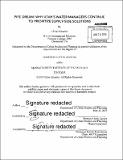Pipe dream : why Utah's water managers continue to prioritize supply-side solutions
Author(s)
Schaefer, Chloe
DownloadFull printable version (5.104Mb)
Alternative title
Why Utah's water managers continue to prioritize supply-side solutions
Other Contributors
Massachusetts Institute of Technology. Department of Urban Studies and Planning.
Advisor
Judy Layzer.
Terms of use
Metadata
Show full item recordAbstract
More than 150 years ago, the Mormon pioneers entered the Salt Lake Valley and immediately set to work digging irrigation ditches and canals to harness what water there was for their farms. Since then, Utah water managers have solved water supply problems by building large infrastructure projects. Today, Utah's population is growing rapidly, but the water supplies that enable its desert oases are not, and climate change is expected to make matters worse. This increasing tension between growing populations and dwindling water supplies is not unique to Utah. However, while other states in the region have implemented aggressive demand-side measures to conserve water, Utah's conservation efforts have been relatively minimal. Utah's history of water engineering, the cultural importance of agriculture, the precedent of federal funding for large water projects, and some of the cheapest water rates in the country make demand-side measures a tough sell for addressing water needs in Utah. However, supply-side projects are costly for taxpayers and for the environment, take decades to complete, and are based on unreliable forecasts of future water demand and uncertain water sources. It is time for Utahans to look past traditional supply-side solutions and embrace water conservation measures, requiring changes to the dominant water planning mindset. In order to do this, the state could take regulatory action, and both the state and LDS Church can act as water efficiency exemplars. It is also time for Utahans to become more involved in Utah's water planning and decide for themselves whether to continue attempting to conquer nature or to live within its bounds.
Description
Thesis: M.C.P., Massachusetts Institute of Technology, Department of Urban Studies and Planning, 2015. Cataloged from PDF version of thesis. Includes bibliographical references (pages 51-59).
Date issued
2015Department
Massachusetts Institute of Technology. Department of Urban Studies and PlanningPublisher
Massachusetts Institute of Technology
Keywords
Urban Studies and Planning.